10 years later: Terri Schiavo prompts horrible reflections of 'beautiful' death
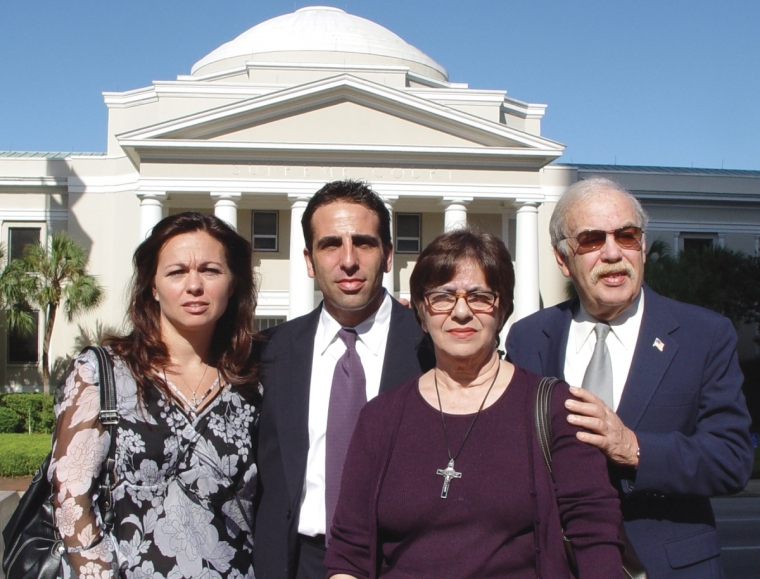
EDITORS NOTE: It's been nine long years since I have written a personal reflection on not only Terri Shiavo's death, but my coverage of her story. In that same spirit, I submit this piece. In that Baptist Press column nine year ago I explored my coverage of the case. By the time I had read volumes of court transcripts, sat in court and listened to Michael Schiavo's attorney, heard Schiavo speak at press conferences, and read excerpts of the attorney's book representing his worldview, the coverage strategy I employed seemed elementary. In fact, my convictions led me to a conscientious approach to reporting that made me wary of seeking to promote views which openly condoned adultery and euthanasia. The same is true today.
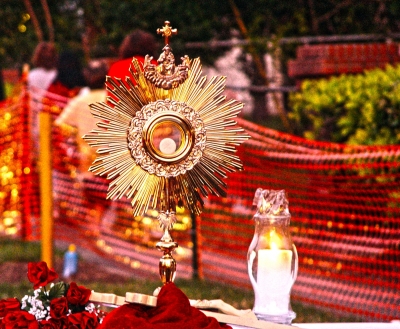
PINELLAS, Fla. (Christian Examiner) -- Ten years after the death of Terri Schiavo I can still picture the green grass in front of Woodside Hospice where she died. I still have in my mind's eye the television cameras within a "tent city" where I lived with the media for 13 days, the stretch of asphalt, the glint of the sun on the Eucharist when her family priest held high the elements for a quick Easter Sunday service.
I remember the fear, too, in the eyes and voices of her family members -- her dad, Bob; her mom, Mary; her brother, Bobby; and her sister, Suzanne. And if we admit it, the fear in the eyes of all of us who provided coverage.
I also recall how utterly devastated family members looked when I spoke with them in the end -- the hope that once sparked in their eyes faded like a dying ember finally turns to ash.
Terri died March 31, 2005, at age 41, about 15 years after collapsing in her St. Petersburg, Florida, home from unknown causes. According to her autopsy her heart was healthy -- likely the reason it took her so long to die. She suffered a brain injury as a result of the collapse and died after a judge's final order to withhold nutriton and hydration was enforced after years of legal wrangling between her husband, her parents, and the courts over her medical care.
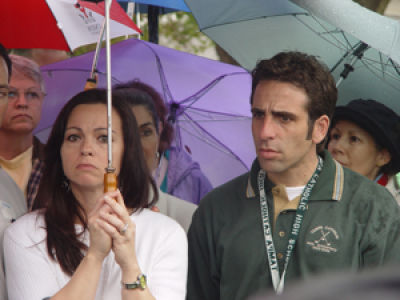
In his column, "I will never forget the look of horror on my sister Terri's Schiavo's face the day she died," Bobby talks about Terri's difficulty swallowing and why she needed a feeding tube in the first place – and how he and family members, and a guardian ad litem had urged Judge Greer to refuse his brother-in-law's dehydration request that ultimately led to her death.
"It's important to differentiate that Terri's condition, and countless others like her, is quite different from a situation where it may be medically appropriate to withhold food and fluids because a person is actively dying and their bodies are shutting down, no longer able to assimilate their food and hydration," Bobby wrote.
Decrying the "never-ending propaganda about the peaceable nature of forced dehydration," Bobby debunks what Terri's husband's attorney told the public during a press conference just days prior to her death. He said she looked "beautiful."
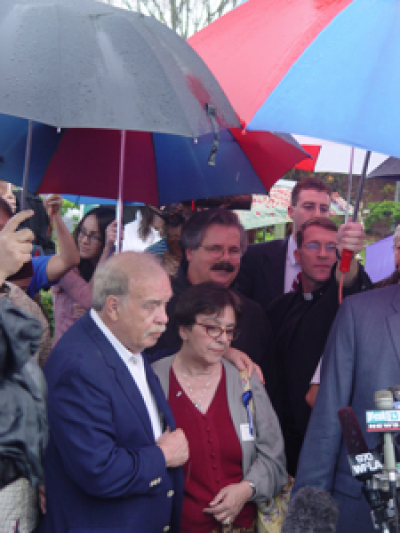
On the contrary, Bobby said: "After almost two weeks without food or water, my sister's lips were horribly cracked, to the point where they were blistering. Her skin became jaundice with areas that turned different shades of blue. Her skin became markedly dehydrated from the lack of water. Terri's breathing became rapid and uncontrollable, as if she was outside sprinting. Her moaning, at times, was raucous, which indicated to us the insufferable pain she was experiencing. Terri's face became skeletal, with blood pooling in her deeply sunken eyes and her teeth protruding forward. Even as I write this, I can never properly describe the nightmare of having to watch my sister have to die this way.
"What will be forever seared in my memory is the look of utter horror on my sister's face when my family visited her just after she died," he wrote.
Bobby's heartbreaking column is honest and disconcerting, and it offers welcome insights after years of incessant chatter about Terri's death regarding what it should or shouldn't mean. He and his family have remained stalwarts in the right-to-life movement, creating the Terri Schiavo Life & Hope Network, developing a pool of resources and support for the medically-dependent and those facing potentially life-threatening situations.
Her death has prompted an international discussion about life issues, and left some wondering, apparently, if marriage laws were ultimately to blame. It's also prompted a look at presidential hopeful Jeb Bush's involvement in Terri's Law, a measure passed in 2003 but later ruled unconstitutional.
LIFE ISSUES
Understandably, the case of Terri Schiavo, the woman who collapsed when she was 26 and then lived for another 15 years -- afthough never fully recovering -- prompted questions about the sanctity of human life and death.
Interestingly, one of her attorneys, Pat Anderson, after serving on Terri's case for more than three years, changed her own views on key life issues after learning about "death with dignity" -- a form of euthanasia "accomplished when there is nobody around to object."
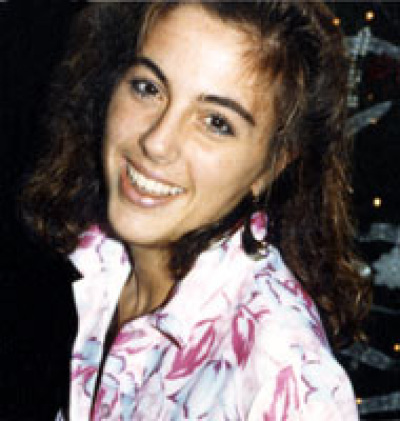
"In many ways, it's the other end of the abortion debate, frankly," she said, admitting she has completely changed her mind on the issue of abortion, despite having defended the practice since she was a young woman.
Ms. Anderson also told me about her disgust that on the word of a "faithless husband, the court was persuaded that Terri wanted to die."
That decision, she said, "will stand, frankly, as one of the hallmarks in American jurisprudence, sort of the high water mark of a manifest injustice, in my judgment, right up there with the Dred Scott opinion."
Calling the decisions in the case "bad law and good policy," Anderson said in America most people "pretend" judges possess "special faculties -- and they don't; they're just ordinary people. The job is what is important."
MARRIAGE
Joe Carter, a communications specialist for Southern Baptists' Ethics & Religious Liberty Commission suggests in a column on the ERLC website "at its core, the Schiavo case was not about bioethics, living wills, or medical choice, it was about the failure to protect the institution of marriage."
It is this needle in the haystack that Ms. Anderson highlights.
At the time, the debate rightly focused on Terri's right to life.
Perhaps now the conversation should shift to the legality and morality of allowing a man who had already moved on with his own personal life to make life and death decisions for the woman he had abandoned.
Terri's husband Michael already had been living with another women and sired two children with her, and he stood to gain from Terri's death because of the diagnosis of a persistent vegetative state the judge accepted that was challenged by many others.
JUDICIARY
The judge in the case, George Greer, admitted to me in a 2004 interview that he "disagrees with himself, sometimes," but insisted that despite all of the pressure he received, he just followed the law.
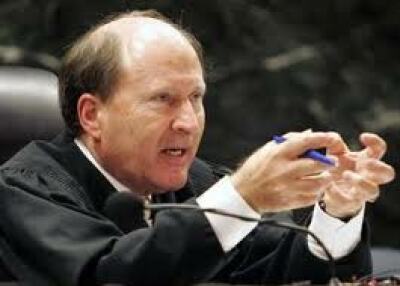
"If I was to do otherwise, I'd be one of those activist judges that the conservatives think are so bad," Greer told me. "That's the definition of an activist judge, is they do what they think it ought to be, irrespective of the law."
Carefully responding to "generic" cases -- but not directly to the Schiavo case, Greer told me it wasn't up to him to effect change, but that it was up to the trial judges who could take appeals.
The judge had been a member of Calvary Baptist Church in Clearwater, Florida, at the time of the Schiavo case, but withdrew his membership after Pastor Willy Rice wrote him a letter seeking a response.
Ten years later, Judge Greer, who retired from the bench five years ago, continues to defend his rulings, telling WFLA news, "I don't know what else I would have done."
That may not be the best argument for the extreme measures taken at the end when Terri was prevented from being given ice chips, chapstick, or even soothing music -- according to her horrified family members who live on with the memory of her not-so-elegant-or-peaceful demise, but it seems to be the best he can muster.
Greer falls back on the excuse that Terri did not have a "living will" although he admits "very few people" in 1990 "in their 20s even thought about an estate plan."
Although he had faced threats of impeachment over his decisions in the Schiavo case, he was given a half dozen awards as a judge and now works as a mediator in Clearwater.
"I think the American justice system came out OK," he told WFLA. "I certainly hope so."
POLITICIANS & TERRI'S MOM
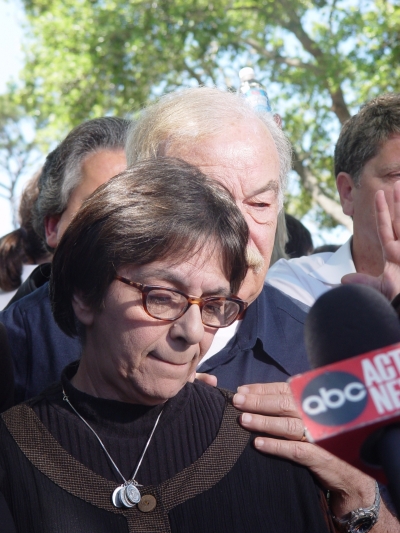
Terri's plight at one point caused so much of an uproar that former Florida Gov. Jeb Bush, the Florida legislature, and former President George Bush tried to intervene.
In the year before her death -- and even in the 13 days before she died -- faxes, emails, news alerts, and telephone calls equally gave us hope and then dashed our spirits.
Talking with Terri's uncle outside the hospice after Terri had lingered for more than a week without food or water, he told me that Mary Schindler, Terri's mom, who I first met in 2003, was grieved beyond measure and not doing well.
My heart just broke for her.
Later, remembering her Catholic faith and how we had a discussion about my early Catholic roots, I reached into my purse and grabbed a rose petal rosary I had there since my mother died. I asked Bobby to give it to her with a hug and tell her I'm praying for her. He hugged me, we exchanged words, and then we cried for a minute.
Mary has finally posted "A Mother's Memories" about those days. She mentions "armed guards and police," Terri being denied the Eucharist, a lack of basic physical therapy for Terri, and Terri's amazing and loving responses to her family.
Some comments provoked by her memories show a dark underside of thought that still is fostered by an alarming lack of knowledge and understanding about Terri's situation.
Other commenters are refreshing in their strong offers of support, and are especially kind in their appreciation for good information and stories that help tell the truth about Terri's death.
Bobby told the Washington Times in a story this week that Florida's former Gov. Jeb Bush "worked hard to help Terri."
"I always felt Gov. Bush was sincere," Bobby Schindler told the Washington Times. "He never backpedaled and he worked hard to help Terri. When Congress passed Terri's Law, it was one of the most bipartisan laws enacted at the time, passing unanimously in the Senate with no objections. In the House the bill passed 203-58."
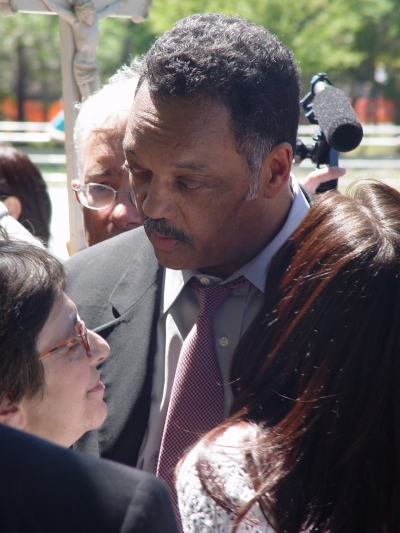
Jeb Bush, in an interview last month with FOX News host Sean Hannity -- who provided almost daily onsite reports from in front of the hospice when Terri was dying -- said, "I acted on my core belief that the most vulnerable in our society should be in the front of the line. They would receive our love and protection."
It is interesting to note that in the very next election cycle of 2008 Democratic nominee and now President Barack Obama said in a debate he would take back his vote to authorize Congress to save Terri -- when asked to name a regret.
"And I think that was a mistake, and I think the American people understood that that was a mistake. And as a constitutional law professor, I knew better," Obama said, according to World News Daily.
Days later, I asked Sen. John McCain, the newly selected GOP nominee for the 2008 presidential election, to clarify comments he made about the Terri Schiavo case the previous year, when he called it "An American Tragedy."
At a news conference at Chick-fil-A headquarters in Atlanta, where he had addressed a town hall meeting, McCain appeared ill at ease in addressing the question and said, "It's a sad situation, it was a terrible situation and one that the state should have handled in retrospect -- and it was a very, very sad situation. ... [T]he plight of this situation moved every American."
In an earlier debate, McCain also had called the matter a "very, very difficult issue" and seemed to have some regrets over Congress' actions.
"All of us were deeply moved by the pictures and the depiction of this terrible, tragic case," McCain said. "In retrospect, we should have taken some more time, looked at it more carefully, and probably [we] reacted too hastily."
Ten years later, it's not surprising that we have a culture that doesn't look at the sanctity of human life in the same way as we once did. No matter one's religious background, ethnicity, or country of origin -- increasingly, our world is focused on economics, self-preservation, and advancement.
We won't ever be able to know what the end result would have been if Terri would simply have been able to go home to her mama's house where she could have slept in her own bed; felt the tickle of her father's whiskers on her cheek; heard the laughter of her brother Bobby coming to check on the family; and enjoy the visits of her younger sister and her angel of a niece.
Instead, we gave in and let a judge decide -- in the face of mounting evidence a marriage had gone amok, facts didn't figure into what the heart knew to be true, and passion was pushed aside for the letter of the law.
Even the United States Supreme Court failed to step in and help the defenseless.
God help us when we stop listening to His still small voice:
"For I was hungry and you gave me food, I was thirsty and you gave me drink, I was a stranger and you welcomed me,I was naked and you clothed me, I was sick and you visited me, I was in prison and you came to me.' Then the righteous will answer him, saying, 'Lord, when did we see you hungry and feed you, or thirsty and give you drink? And when did we see you a stranger and welcome you, or naked and clothe you? And when did we see you sick or in prison and visit you?' And the King will answer them, 'Truly, I say to you, as you did it to one of the least of these my brothers, you did it to me" (Matt. 25: 35-40)